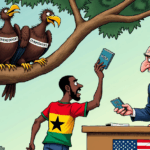
A seismic shift in United States visa policy for Ghanaian citizens raises concerns about economic impact, educational dreams, and the very fabric of transnational families.
Diplomatic and certain family-based visas continue to provide their multi-entry benefits. However, the new policy is a major setback for the majority, dramatically limiting travel for business, tourism, and especially student travel.
The U.S. State Department, Bureau of Consular Affairs, attributes these changes to a global reciprocity realignment, a shift from previous visa terms, which often allowed for multiple entries over two years or more.
It emphasises the need to align visa privileges with those offered by Ghana to U.S. citizens. This move reflects similar policy revisions implemented for other countries, including Nigeria. It signals a broader trend in U.S. immigration enforcement. The policy, far from being simply an administrative adjustment, carries profound and often painful human implications. It is indeed testing the resilience of Ghanaian aspirations and the diplomatic ties between the two countries.
Dreams Deferred, Businesses at Risk
For the average Ghanaian who might previously have had aspirations for multiple trips to the crowded shopping malls of New York or the tropical beaches of Florida, the harsh reality of a single-entry, three-month visa for B-class categories (business and tourism) is a daunting obstacle.
“This isn’t just about a vacation,” said Ama Sutherland, a textile importer from Accra. “My business relies on regular trips to the U.S. to source materials. Now, every three months, I have to reapply, pay new fees, and face the uncertainty of approval. It’s a direct attack on my livelihood.”
This sentiment is being felt across Ghana’s business sector as the increased costs and unpredictable processing times are threatening to stifle growth and sever essential trade connections. With the average monthly living income in Ghana around $300 USD (approximately ¢3,126 GHS), the added expenses of frequent visa applications—each typically costing $185 (approximately ¢1,927.7 GHS)for B-class visas and possibly a new $250 (approximately ¢2,605 GHS) “visa integrity fee” for issuance starting in 2026—can become impossible to bear.
Research has indicated that if visa restrictions are made too stringent, it can lead to a sharp decline in tourist arrivals and enormous revenue loss for the tourism industry. For a developing economy like Ghana’s, every obstacle to trade and tourism is a blow to its growth and its people, impacting industries already grappling with economic challenges and potentially moving business and leisure travel to other destinations that are more convenient and less prohibitive for visitors to Ghana.
The Students’ Dilemma
The impact on Ghanaian students is particularly poignant. What once was an F-1 visa allowing for multi-year academic programmes with opportunities to come back home for holidays now offers but one entry and three months’ validity. This means that a Ghanaian student wishing to go home to Accra for Christmas with their family must reapply for a new visa to continue school, a process fraught with anxiety, expense, and potential delays.
“My education is my future,” said Kwame Marfo, a Ghanaian student pursuing engineering in Texas. “The thought of not being able to see my family for years, or having to reapply and risk my visa every time I leave the U.S., is heartbreaking. It makes me question if studying abroad is worth this emotional and financial burden.”
This concern is compounded by recent reports that the Trump administration has, in recent times, demonstrated fresh interest in the process of scrutinising student visa applicants, including expanded social media vetting. The pressure is a reality; Ghana, for the first time, made it to the U.S. State Department watch list due to an observed student visa overstay rate of 21%, exceeding the U.S. acceptable limit of 15%.
This data, acknowledged by Ghanaian authorities, is reflective of students caught between a rock and a hard place: striving for education abroad, but facing challenges that will put to the test their determination and financial resources.
This might lead some Ghanaian students to turn to countries like Canada or the United Kingdom. These countries have been active in aggressively recruiting foreign students and may have more liberal visa frameworks.
In addition, entry points for post-study work, potentially diminishing the flow of Ghanaian talent to American institutions.
Reciprocity or Restriction
While the U.S. government maintains that these changes are based on reciprocity and addressing concerns about visa overstay rates, particularly among certain African nations, including Ghana. The government of Ghana has voiced its strong disapproval.
“Ghana has always cooperated with the U.S. authorities in the processing and removal of Ghanaian citizens who have been cited for deportation,” stated a spokesperson for Ghana’s Ministry of Foreign Affairs and Regional Integration, expressing “concern and disappointment” at the U.S. decision.
This underscores a perceived imbalance, where Ghana feels it has upheld its end of the relationship, yet its nationals face increasingly restrictive measures.
Foreign Affairs Minister Samuel Okudzeto Ablakwa further confirmed that 56 out of 188 Ghanaians listed for deportation by U.S. authorities had already returned home, emphasising Ghana’s cooperation.
The U.S. perspective
These measures are framed within the broader context of maintaining the integrity and security of its borders and immigration system. A U.S. State Department spokesperson, when discussing similar reciprocity adjustments, reiterated that “visa criteria and standards are designed to protect the integrity of U.S. immigration systems.
These standards are based on global technical and security benchmarks, and “visa reciprocity is a continuous process and is subject to review and change at any time, such as increasing or decreasing permitted entries and duration of validity.”
The U.S. Embassy in Accra recently reinforced its visa policy. They reminded visa holders that “A US visa is a privilege, not a right.” This statement resonated deeply across Ghanaian social media. For some, it felt uncomfortable. This highlights the U.S. commitment to ensuring compliance with immigration laws to prevent overstays and other violations, a critical component of their national security system.
Effect on Bilateral Ties
This policy shift, though framed within the technicalities of international relations, is deeply personal for Ghanaians. It touches on dreams of exploration, the pursuit of knowledge, and the very fabric of family connections. The hope remains that ongoing dialogue between the U.S. and Ghanaian governments can lead to a more balanced approach. It will ease these burdens while still addressing legitimate security concerns and ensuring that the cherished bonds between the two nations continue.
The policy’s impact extends far beyond individual travellers. It is affecting the very dynamics of U.S.-Ghana relations. This could potentially hinder future collaborations in trade, education, and cultural exchange. Furthermore, it sends a message of uncertainty. This uncertainty might deter even those with sincere intentions of travel and study.
The long-term impact on the strong U.S.-Ghana relations relies on a path that must acknowledge the concerns of both countries. It must also avoid unfairly penalising the hopes of everyday Ghanaians. Otherwise, it risks fostering resentment. It could even inadvertently undermine the principles that have historically strengthened the bond between the United States and Ghana.
